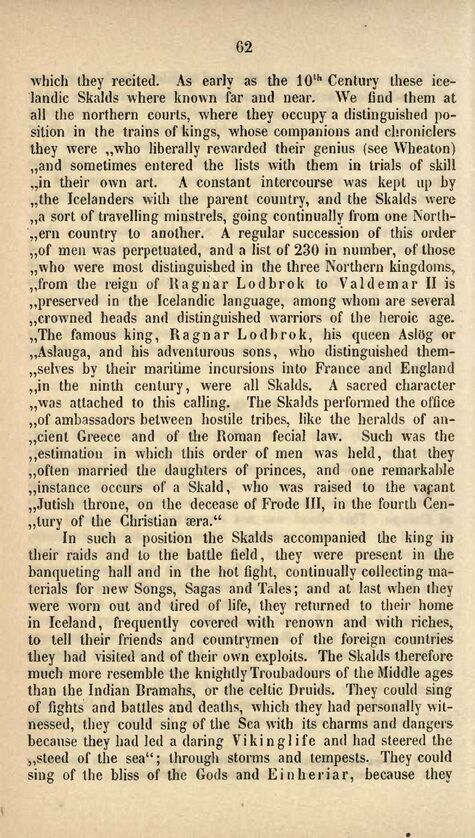
Full resolution (JPEG) - On this page / på denna sida - The Old Norsk Poetry and the Sagas

<< prev. page << föreg. sida << >> nästa sida >> next page >>
Below is the raw OCR text
from the above scanned image.
Do you see an error? Proofread the page now!
Här nedan syns maskintolkade texten från faksimilbilden ovan.
Ser du något fel? Korrekturläs sidan nu!
This page has been proofread at least once.
(diff)
(history)
Denna sida har korrekturlästs minst en gång.
(skillnad)
(historik)
which they recited. As early as the 10th Century these
icelandic Skalds where known far and near. We find them at
all the northern courts, where they occupy a distinguished
position in the trains of kings, whose companions and chroniclers
they were „who liberally rewarded their genius (see Wheaton)
and sometimes entered the lists with them in trials of skill
in their own art. A constant intercourse was kept up by
the Icelanders with the parent country, and the Skalds were
a sort of travelling minstrels, going continually from one
Northern country to another. A regular succession of this order
of men was perpetuated, and a list of 230 in number, of those
who were most distinguished in the three Northern kingdoms,
from the reign of Ragnar Lodbrok to Valdemar II is
preserved in the Icelandic language, among whom are several
crowned heads and distinguished warriors of the heroic age.
The famous king, Ragnar Lodbrok, his queen Aslög or
Aslauga, and his adventurous sons, who distinguished
themselves by their maritime incursions into France and England
in the ninth century, were all Skalds. A sacred character
was attached to this calling. The Skalds performed the office
of ambassadors between hostile tribes, like the heralds of
ancient Greece and of the Roman fecial law. Such was the
estimation in which this order of men was held, that they
often married the daughters of princes, and one remarkable
instance occurs of a Skald, who was raised to the vacant
Jutish throne, on the decease of Frode III, in the fourth
Century of the Christian æra.“
In such a position the Skalds accompanied the king in
their raids and to the battle field, they were present in the
banqueting hall and in the hot fight, continually collecting
materials for new Songs, Sagas and Tales; and at last when they
were worn out and tired of life, they returned to their home
in Iceland, frequently covered with renown and with riches,
to tell their friends and countrymen of the foreign countries
they had visited and of their own exploits. The Skalds therefore
much more resemble the knightly Troubadours of the Middle ages
than the Indian Bramahs, or the Celtic Druids. They could sing
of fights and battles and deaths, which they had personally
witnessed, they could sing of the Sea with its charms and dangers
because they had led a daring Vikinglife and had steered the
„steed of the sea“; through storms and tempests. They could
sing of the bliss of the Gods and Einheriar, because they
<< prev. page << föreg. sida << >> nästa sida >> next page >>